‘Our planet is drowning in plastic waste’, don’t we hear this often? However, when I read these shocking statistics on the United Nations website, could not resist reaching out to you all, my Tribe!
Today, we produce about 300 million tones of plastic waste every year. That is nearly equivalent to the weight of the entire human population.
Are we now that dependent on plastic? I really think we need to change these statistics, do you?
Why Plastic is harmful?
While we all are busy thinking about our short term convenience and keep increasing plastic waste; our rivers are transporting plastic waste to oceans. There are actually plastic accumulation zones in our oceans, the biggest of them is the great Pacific garbage patch. If current trends continue, our oceans could contain more plastic than fish by 2050.
5 Gyres.org state that, ‘more than 1,200 species are impacted by plastic, through ingestion or entanglement—both of which can sicken or even kill them. Birds, fish, turtles, dolphins, sharks and even whales can be poisoned or trapped by plastic waste. And all animals (including humans) depend on the ocean for food and a healthy ecosystem that maintains the balance of greenhouse gases. Scientists agree: If the oceans die, we die.’

Researchers are finding how corals are ingesting plastics and are not digesting it. Or how fish, turtles, whales are eating plastics. But that is not all, the fish eaters are eating plastic too and the plastic is now present in our table salt. Researchers also found out traces of plastic in human bodies and microplastic present in rain.
But plastic can really harm humans? WHO published that researchers have found out that plastics can cause autism, cancer, diabetes & birth defects. So be very very careful when you are using plastic meal boxes or plastic teethers or pacifiers for your kids.
Some argue that plastics are not all that bad, you can recycle them. But not all plastics can be recycled and there is a limit to recycling plastics, so in the end, plastics sit on the landfill or floats in the oceans breakdown and pollute our natural resources. However, this not the only way plastic create pollution; the production of plastics also greatly contributes to climate change.
Myths about environmentally friendly plastic
Like many other industries, the plastic industry also uses ‘greenwashing‘ to present their products as more ‘eco-friendly’ than they actually are. Some of the regularly used terms for plastics are explained below.
Bioplastic
There are a lot of misconceptions around Bioplastics. Bioplastics are made from a number of renewable resources such as plant oils, cellulose, starches, sugars, carbohydrates, bacteria, and algae, etc. But manufacturers started making plastics partially from non-renewable sources and started calling such plastic ‘ Bio-based plastic’. The plastic news has clearly explained the myths about bioplastics.
People also get confused between bioplastic and biodegradable plastics
Biodegradable Plastics
‘Degradable’ or ‘Biodegradable’ plastics, mostly used for shopping and rubbish bags, contain additives that make them disintegrate more quickly than traditional plastics. So these bags do not remain in the environment as large debris and they break into smaller particles quicker than other plastics. However, these small plastic particles turn into microplastics, in turn, it appears in natural food chain much faster; eaten by fish, birds, etc. remain in the environment in the form of microplastics
Healthcare plastic waste
Definitely, there are uses of plastics that are at the moment not replaceable for example some critical functions in the medical industry. But the use of the plastic can be made optimum even in medicines for example instead of giving a free plastic measuring cup or spoon with every liquid medicine, pharmaceutics companies can sell stainless steel measuring cups to customers which we can use lifelong. The huge amount of medical plastic waste is generated, read here a case study of healthcare plastic waste.
How can you solve the plastic problem?
If you look into your garbage bin at home or at the workplace, you will find a certain type of plastic waste on a daily basis. Single-use disposable plastic items, plastic packaging, etc. But don’t get fooled that these are the only primary plastic waste. Plastic is now used for so many products we use and in so many different forms that if we need to beat plastic pollution, we need to go deeper and find plastic waste in our life, peeping in garbage bin is not enough. This is a simple and quick guide for reducing plastic waste.
1. Say no to single-use plastic items
From my experience, it is not very difficult to eliminate single-use plastic items in your daily life. If you need to have your coffee or tea; ideally you should make it at home and carry it in a thermos coffee mug, or you can also bring your own coffee mug and take away your drinks. The same applies to the water bottle, invest in a good reusable one, and take it with you.
Ideally better to pack your meals, but if you happen to eat out a lot, carry your own meal box, cutlery and you can reduce consumption of single-use plastic disposable items every day. You can ditch the straws or get reusable ones.
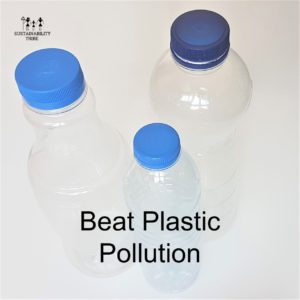
Here is a great list of reusable items, you need to invest and keep using in your day to day life which will help in reducing plastic waste. If you tend to forget these items at home, my suggestion is to leave a set in the car or at the workplace.
2. Shop plastic-free
Packaging makes nearly half of total plastic waste, so keep this thought in mind when you are going shopping. Carry your own reusable bags, produce bags, refillable containers, and keep your shopping as much plastic-free.
Read here about how to make your own plastic-free shopping kit and how to do plastic-free shopping. Always choose loose fruits and vegetables instead of wrapped in plastic cling film. In case you forget your plastic-free shopping kit at home, at least make sure to avoid a dedicated plastic bag for every item. It is also a good idea to buy non-perishable items in bulk, especially if it is packaged in plastic.

3. Reuse Plastic
If the plastic containers, packaging items, plastic bags ended up in your house or if you already have them, try to reuse them, upcycle or repurpose them. You can always use plastic bottles, containers to refill toiletries, etc while shopping.
You can get creative and use plastic around the house or event at work to make some functional items out of it, instead of buying new things. Here is a great list of creative reuse of plastic, which might inspire you to take up a plastic reuse project at your home.
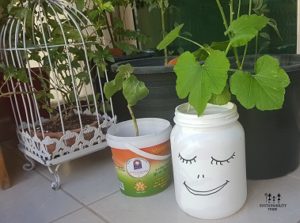
4. Recycle plastic
Now, this is a very important step, we all should recycle plastic waste to stop it from polluting our land and seas. Every time you are not recycling plastic this is what happens.
Different types of plastic take different timelines to breakdown and pollute our land and sea ecosystem. HDPE takes 100 years, LDPE 500 years, and PP 1000 years to break down. The toxic chemicals in plastic interact with water and leach into the ground and pollute groundwater reservoirs harming wildlife and people. When plastic degrades in the environment or landfill several harmful greenhouse gases are emitted to the atmosphere which contributes to further global warming. Find more about the UAE’s waste facts and statistics.
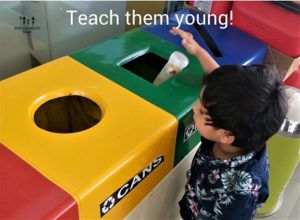
However, recycling is not just tossing recyclables in the recycling bin, there are the right methods and ways of recycling we all need to follow to make sure that our recyclables are actually get recycled at the recycling facility.
Here is a quick guide about where to recycle in the UAE.
5. Buy plastic-free items
We just read recycling plastic is important, but sadly many plastics are not recyclable. However, if you are thinking that buying plastic items will recyclable a few times; remember, in the end, all plastics reach this stage when they not recyclable anymore. So my recommendation is not to buy plastic items and look for sustainable alternatives. For example, when I can buy a glass or stainless steel bottle, why buy that BPA free plastic bottle?
More we stop buying plastic items, the demand for plastic will go down and demand for plastic-free alternatives will increase.
6. Boycott microplastics
What are microplastics? The plastic particles which 5 mm or lesser in size. They can be microfibers, microbeads, or pellets also known as nurdles.
All the plastics after breaking down and degrading turn into microplastics. However, we also buy microplastics and use them in our daily life through cosmetics, clothing, chemicals, plastic packaging, and all the plastic items.
Exfoliating cosmetics including scrubs, face wash, body wash, toothpaste, hand wash typically contain polyethylene or microbeads. The better alternative is to create your own beauty products and natural scrubs, read here.
The clothing made from synthetic fibers such as polyester, nylon, and acrylics contains microfibers of polymers. The sportswear, fleeces are common examples of synthetic clothes. 60% of total clothing is made from synthetic fibers. Every time you wash these clothes, these microfibers are releases in the wastewater. The microfibers are found in oceans, rivers as well as air. So yes, we might also be breathing microfibers.
Microplastics are so widespread by now that they can be found accumulated in soil, oceans, freshwater as well as air. These microplastics have now integrated into biological organisms. Through ingestion and respiration, microplastics can become embedded in animal tissues. You can read the report and study about Sources, Fate, and Effects of Microplastics in the Marine Environment.
This video by Storyofstuff is an eyeopener.
Think again, if you still want to use those synthetic fabrics or ‘micro-exfoliates’?
7. Rethink packaged food
Now when we are talking about packaged food, it’s not just take away food in plastic containers. Most of the ready to eat food come in plastic packaging think your favorite chips, coffee sachets, sodas, gums, icecreams, yogurts, and whatnot.
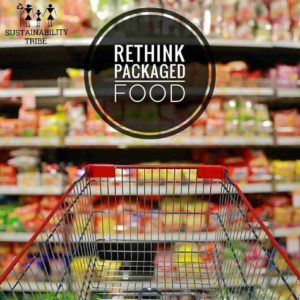
So if you want to reduce plastic use then you will also have to eat more fresh, healthy, homemade food. Who wouldn’t like the perk of improved wellness while going plastic-free? Read our complete guide to sustainable eating.
8. Use your consumer power
Use your consumer power and start insisting on plastic-free options. Start by talking to store managers, F&B outlets about plastic packaging and tell them that you and friends will like plastic-free solutions. Use social media to let brands know about how you would like them to use less plastic, don’t forget to tag and mention the brands. Put pressure on manufacturers. And yes most importantly spread the word in friends and family.
9. Leave only footprints
When you visit outdoors the greens forests, mountains, rivers, lakes or it could be local parks, ponds; do not throw plastic waste. Most of the waste left in the wild or outdoors end up degrading there and polluting the environment. Bring your waste with you and dispose of it, recycle it.
Leave nothing but footprints!
10. Clean up
When visiting Nature, leave nothing but footprints. On top of it, it’s better to start a good habit of cleaning up. You might have heard about ‘Take 3 for the Sea’, it’s a practical and doable action of picking at least 3 pieces of the garbage when you leave the beach. However, what we follow as a family is every time we visit desert, mountains, beach, or any outdoor close to Nature place, we clean up a surrounding patch where we sat down for a picnic or for taking photos. We follow it everywhere we go either for vacation, travel, or regular outings.
If you really want to do something good for our planet and our future generations, you don’t need to wait till someone organizes a cleanup event.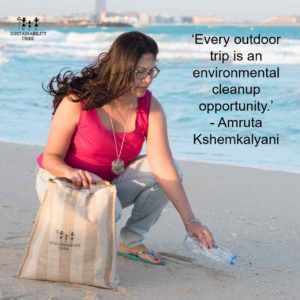
Hope you are now thinking of going plastic-free, a good idea is to start with the Plastic-free July challenge. You can find more tips about reducing waste and I highly recommend having a look at our #ZeroWasteUAE social initiative and join it.
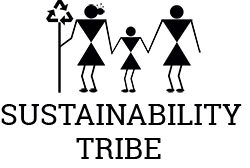
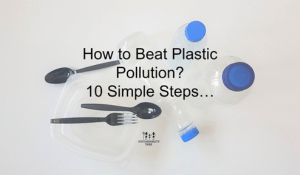
3 Comments
Good One
this is the best article I’ve read this year. Serious gold
thank you for such valuable content.
Thank you Usman
Comments are closed.